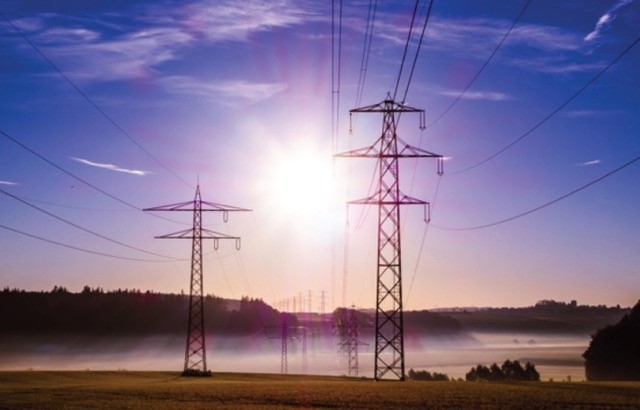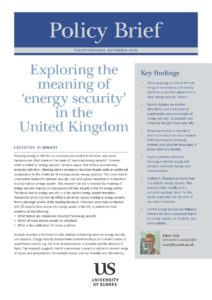By Claire Copeland, Research Assistant, Policy@Sussex
SPRU researcher Emily Cox has conducted a thorough analysis of what is meant by the term “energy security” in the UK. In this policy brief she examines a range of definitions with implications for energy policy.
Most people, certainly in the UK and other developed countries, can understand that a secure energy system is vital for our day-to-day functionality. The UK government are also often using the term “energy security” as justification for particular actions or policy direction.  However, if asked to define “energy security” people are likely to provide different answers. Emily sought to find the key factors underpinning the meaning of “energy security” with a particular focus on the transition to a low-carbon energy system. The data for her analysis is collated from the literature and interviews with 25 UK energy experts from a range of organisations and backgrounds.
However, if asked to define “energy security” people are likely to provide different answers. Emily sought to find the key factors underpinning the meaning of “energy security” with a particular focus on the transition to a low-carbon energy system. The data for her analysis is collated from the literature and interviews with 25 UK energy experts from a range of organisations and backgrounds.
Generally, “energy security” tends to be used in the context of energy self-sufficiency or dependence on energy sources from unstable regions. The transition to a low-carbon energy system – where there will be a higher proportion of intermittent renewable sources – adds a necessary further dimension to the definition of “energy security”.
When presented with the range of factors Emily had found in the literature, the energy experts interviewed could not agree on a single most important element, but felt that a range of issues needed to be considered. There was reasonably strong agreement that factors relating to a low-carbon energy system i.e. flexibility and resilience, were very important. Import dependence and constraints on availability of resources were generally seen as a much less important factor for “energy security”. Some experts also pointed out that measures to improve “energy security” can have co-benefits in affordability and sustainability too e.g. demand reduction measures.
In terms of policy implications, Emily’s research finds that – in order to assess the security of a low-carbon energy system – broader measures need to be taken  rather than traditional ones e.g. import dependence. The need for investment in infrastructure is going to be a key element in the security of a low-carbon energy system and this requires policy stability and long term planning. Interconnections with the rest of Europe will of course be an example here. There is a concern, in the negotiations following the EU referendum, that “energy security” may be reduced to its more traditional focus rather than embracing new broader measures appropriate for a low-carbon energy system.
rather than traditional ones e.g. import dependence. The need for investment in infrastructure is going to be a key element in the security of a low-carbon energy system and this requires policy stability and long term planning. Interconnections with the rest of Europe will of course be an example here. There is a concern, in the negotiations following the EU referendum, that “energy security” may be reduced to its more traditional focus rather than embracing new broader measures appropriate for a low-carbon energy system.
Download the Research Brief document: Exploring the meaning of ‘energy security’ in the United Kingdom [PDF 719.74KB]


Leave a Reply